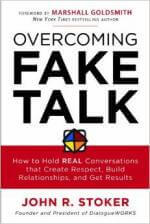3 Tips to Overcome Fake Talk and Have a Real Conversation
Do you have the skills it takes to handle a difficult conversation? The Public Speaker interviews author John Stoker about how to overcome fake talk and have a real conversation.

When it comes to difficult conversations, most of us simply don’t have the skills to turn them into the positive results we’re looking for. We don’t take the time to prepare, and we let emotion control the outcome.
In Overcoming Fake Talk, John explains that we need to keep conversations above the line. When someone goes below the line, they use sarcasm, personal attacks, and anger to make their point. A conversation that stays above the line has a tone of respectfulness, curiosity, and authenticity.
I asked John to share his top tips with me for turning a tricky conversation from ordinary to extraordinary.
Tip #1: Raise Your Own Awareness
We should be more aware of what’s going on within ourselves and with others. Most of us are so focused on what we are thinking and feeling, we forget to act as a participant and observer.
For example, if you are able to recognize a downward spiral in your conversation (e.g. you hear words of blame, raised voices, or sarcasm) you can manage the situation more effectively.
Tip # 2: Prepare or Beware
You need to prepare for a difficult conversation—particularly if you are planning to finally discuss an “undiscussable.”
Plan your conversation beforehand. Know where you’re going to start, know where you need to go, and know when you’re done. It’s important to remind yourself of the intent of your conversation, especially if you’re angry or hurt. Try to imagine what the other person may be thinking or feeling.
Tip #3: Listen Better
We don’t do a good job of listening to each other—especially when it’s a difficult conversation. Often, when the other person is talking, we’re thinking about what we’ll say next. We’re listening for agreement to our point, but we’re not watching for nonverbal signals, tone, and other cues.
Stop assuming you know all the answers. Ask questions and be surprised at what you learn.
I learned some important new skills from my talk with John Stoker. If you want to learn more, listen to the full interview here.
If you have any questions, feel free to ask them in the comments below or connect with me on Facebook.
This is Lisa B. Marshall, Helping you maximize sales, manage perceptions, and enhance leadership through keynotes, workshops, books, and online courses. Passionate about communication; your success is my business.
Listening image courtesy of Shutterstock.
You May Also Like…








